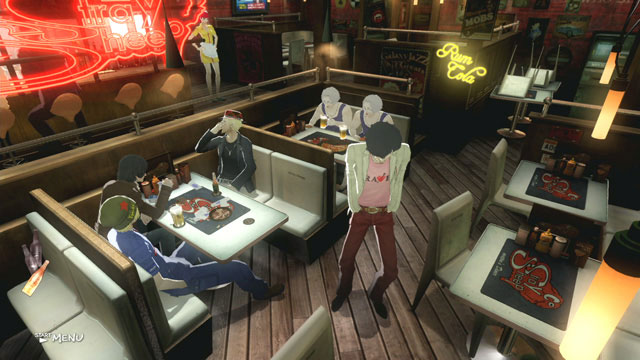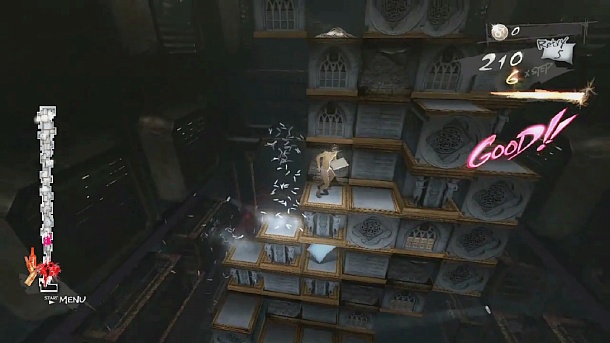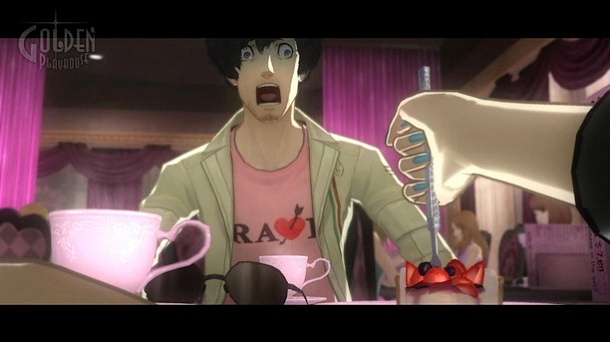Fed up with the same old first-person shooters, sport simulations and beat-em-ups? Why not cheat on your girlfriend for change?
Rated M for Mature upon its release in America, Catherine is a game that actually lives up to that rating. It may have a sexually provocative exterior (likely a clever ploy to get guys to fork over the cash), but there isn’t any onscreen sex or nudity. Deep down this is a game that tackles complex issues about relationships, infidelity, marriage and commitment. Things which most teenagers probably don’t have all that much experience in (unless they’re avid watchers of Hollyoaks) and for that reason I don’t see many of them getting a kick out of this game. This is both an arcade-style puzzler and a dialogue-heavy game.
32-year-old Vincent Brooks is a rather aimless guy who works as a systems engineer and has been in a relationship with his girlfriend Katherine for five years. She presses him towards commitment, but he has no intention of getting married. While out drinking with his friends at the Stray Sheep bar he ends up meeting the young blonde Catherine and ends up spending the night with her after she seduces him. Vincent also starts having dreams where he has to climb blocks and everyone is represented as sheep. All the while, the news making the headlines is that a number of young guys are dying in weird circumstances. The rumour goes that they all happened to be cheating on their wives or girlfriends. Vincent, however, doesn’t believe in curses.
Directed by Katsura Hashino, the man behind Atlus’ acclaimed Persona 3 and Persona 4 (there’s even a book on Vincent’s bookshelf called Persona), Catherine strives (and succeeds in places) to be as cinematic as possible with its cut scenes. It even opens with a joyful introduction, as Midnight Venus Trisha (with her shiny afro) informs us that, “tonight’s story is an unconventional romantic horror.” It’s similar to the way those late-night movies are introduced by a knowledgeable host (I doubt any readers remember the UK equivalent; BBC 2’s Moviedrome). It’s a strange intro, setting the player up into believing that they’re going to experience something special.
Gameplay during the day is where most of the story plays out, as Vincent drinks and chats with his friends at his favourite hangout, Stray Sheep. He receives text messages from Catherine and Katherine, and can opt to respond to them, as well as conversing with fellow characters that frequent the bar. It’s during the Nightmare sequences that the crux of the game reveals itself with Vincent having to climb a tower of blocks. This involves pushing and pulling blocks to create a path that will allow Vincent to reach the top, avoiding torturous traps and crumbling rows that fall from the bottom. Supposedly all the pushing and pulling is meant to be some kind of metaphor on relationships. From talking to other sheep you’ll be able to pick up certain techniques to make your climb less strenuous. There are so many that I even forgot some of them.
I found block climbing to be strangely addictive. After being killed by a giant baby I was saying, “just one more go.” You do feel quite pleased with yourself once you find the correct route and in some cases there’s more than one. Sometimes it’s staring you in the face and you just can’t see it, while other times you can end up making things more difficult for yourself. The later levels do get infuriatingly hard, so make sure you save your game whenever you can. It’s during play in the Nightmare sequences that classical themes from the likes of Bach, Chopin and Beethoven are heard, reworked to brilliant effect by Shoji Meguro.
When released in Japan, many found the climbing sections of the game too difficult, so much so that Atlus released a patch that included a Very Easy mode. This mode is also available here. There is also an undo option available to correct a single block move on Very Easy, Easy and (unlike the Japanese version) Normal modes as well. The inclusion of this on the Normal mode is probably one of the biggest differences between the two versions. I will say that I rarely found it as taxing as I was led to believe, personally finding the Clock Tower stage the hardest, but I never had to retry a level more than 7 or 8 times.
The game has a morality system, where before ascending to the next level Vincent must enter a confession booth where he is asked a question. These questions range from: “Does life begin or end at marriage?”; “Is romance annoying?” and “Cosplay in the bedroom: Aye or Nay?” Your answers will affect certain situations during the game, the overall story, and if you’re playing in front of your partner, they’ll most likely get you into trouble as well. Interestingly I’ve noticed that if you decide to reset the game and replay the confessional booth to give a different answer, you’ll instead be given an entirely different question. Your morality will also be affected when it comes to responding to general questions at the Stray Sheep and even how you respond to texts. Depending on your choices, Vincent could end up with Catherine or Katherine. To add a bit of reply value, there are eight endings in total. To confuse the player, there are times when you have no idea which Catherine/Katherine Vincent is talking about, with the subtitles in the game sometimes leaving the name out.
Catherine opens with a quote from Shakespeare’s As You Like It. “All the world’s a stage, and all the men and women merely players.” As the game loads, you’ll find that there are plenty of appropriate quotes thrown in, likely done to sway your decisions at crucial points. Interestingly one quote comes from a fictional character that’s in the game! There’s also a sly knowingness about being a videogame. One character mentions the arcade game Rapunzel in the Stray Sheep (which you can also play), describing the girl in the game as a “hottie” only to be told that she’s just a bunch of pixels, almost as if speaking to gamers that might have a thing for the fictional Catherine. Upon completion, Midnight Venus says straight out, “games are lovely creations.”
The double-edged sword here is the lead character Vincent, who, regardless of what decisions you make, is a bad man! Unlike many other games, the difference here is that he’s racked with guilt. He starts off as a bit of a dimwit that lacks the confidence to be truthful with his girlfriend. With this in mind, one has to wonder why the girls are so attracted to Vincent, who even questions this himself at one point. It’s not just him. The game presents men as flawed individuals, some even reminiscing on their faults and how they’ve treated women. However, during the Nightmare sequences, Vincent is a completely different person, seen as more of a heroic figure amongst the other sheep, boosting morale.
Atlus has gone all out with hiring an entire English voice cast that includes Troy Baker, Laura Bailey and Michelle Ruff. It’s a shame that the game doesn’t include the option to play it in its original Japanese language, but the English dub is still very impressive.
Catherine is totally unconventional. It’s a miracle that a game this crazy was made at all, let alone found a Western release. It is audacious enough to tackle topics often found in soap operas and works them into a story so involving that you play through wanting to know what will happen next and how it’s all going to end. The offbeat humour also reminded me that it has been a long time since I’ve laughed so much when playing a videogame. That it doesn’t fall into any particular genre only strengthens the streak of originality that runs through the game, and I don’t imagine any other developers trying to emulate it any time soon.
If Atlus and Katsura Hashino wanted Catherine to cause gamers to question their relationships, then they’ve succeeded… lest it actually turn them into philandering cheats that end up on The Jeremy Kyle Show.
(As of writing, Deep Silver has unfortunately not issued the game with a UK release date yet. Some retailers have listed a preliminary date of October 28th, while others have it pencilled in for December 9th. If you really can’t wait, then the game can be purchased on import. Do note that while the PS3 version is region free, the XBOX 360 version is not.)
The review is presented as when it was originally published on MCM Buzz on 31 August 2011.







